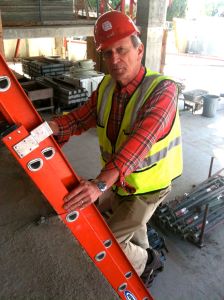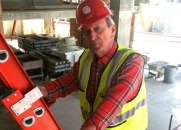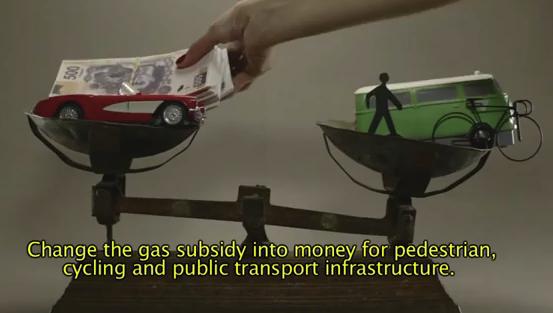
Photo by Greg Hanscom.
Denis Hayes is about the last person on the planet you’d expect to find walking around a construction site in a hardhat, chatting up engineers and contractors. Hayes is best known as the guy who coordinated the first Earth Day, back in 1970, when he was 25. Since that time, he has earned a reputation as a fierce defender of the environment, raking in every imaginable green accolade. Today, he is honorary chair of the Earth Day Network by night, and by day he’s president and CEO of the Bullitt Foundation, a major force in conservation in the Northwest.
But Hayes is full of surprises. He directed the National Renewable Energy Laboratory under the Carter administration and has taught engineering at Stanford. He can talk BTUs-per-square-foot-per-year with the best of them. Which is handy, because at the moment, Hayes is orchestrating the construction of a new, uber green headquarters building for Bullitt. The building sets out to meet the Living Building Challenge, which means, among other things, that it will generate all of its own water and electricity. The latter is no small feat, when you consider that the building is in infamously gray Seattle – not exactly a Mecca for solar power.
With Earth Day 2012 looming (it’s Sunday, people!), I caught up with Hayes to talk about the big day, green building, and his prognosis for the planet. Here are some snippets of what he told me:
On what he’s doing for Earth Day this year:
I’m going to Washington.
On where the real action will be:
There will be tens of thousands of smaller, grassroots events around the world. We [the Earth Day Network] have a gangbuster new organizer in India. We’ve got events planned in China, Ukraine, in Arab countries somewhat related to Arab Spring …
On the relevance of Earth Day:
Virtually every school in the country does an Earth Day activity or event. Earth Day is the gateway drug to environmentalism.
On the relevance of environmentalism:
We need a shot in the arm. We’ve been pretty disappointed with the environmental movement’s failure to capitalize on things that have gone wrong – the Gulf of Mexico oil spill, the nuclear meltdown in Fukushima. These things were all over the headlines, and yet what new policies have they led to?
On the Bullitt Foundation’s new emphasis on cities:
We were, for a long time, the only large environmental foundation in the Northwest. We were involved in the grand forest fights, the fight over the spotted owl, incineration of nerve gas at Hanford. Now there are several dozen environmental foundations in the Northwest, and most of them are focused on nature. There are very few that work on people.
On green building:
It’s irresponsible to build a building that’s not LEED platinum.
On the difference between LEED and the Living Building Challenge:
LEED is just more prescriptive standards. This is all performance-based. We won’t know if we’ve passed for at least a year.
On why Bullitt is framing its building with (green certified) timber:
We’re trying to create a new vernacular for regional architecture. Eighty years ago, if someone showed you a building in Santa Fe, Atlanta, and Anchorage, you would know instantly where those buildings were. Today, it’s all the same damn building.
On the building’s earthquake friendliness:
I don’t know that we can withstand a 10, but I think we can withstand a 9.
On solar power in Seattle:
The sun doesn’t shine here. People think it’s impossible to operate a house on solar energy in Seattle. We basically told the engineers, you’ve got an energy budget of 230,000 kilowatt-hours per year. Design a building that works within that.
On making the elevator as unattractive as possible to save energy:
It will be slow by design, but it will not, as I wished, play bagpipe music.
On using a composting toilet, six stories up:
Sheeeeeew, plunk.
On becoming a green developer:
I find that I quite enjoy it. Nothing would make me happier than to finish this building, spend one year in it, and then have someone buy it from us and start over again.
On why he’s so damned upbeat:
If you don’t have hope, you’re doomed.



